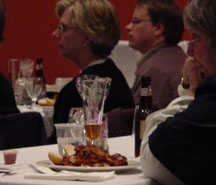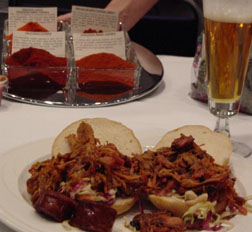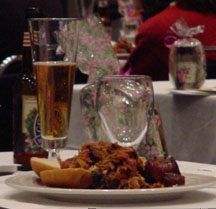|
Slow
Food, Barbecue and Beer
In Chicago,
the Goose Island Brewing Co. is an icon for beer lovers - and its
support of the Slow Food group in the city helps promote craft beer
with food. Devotees of real 'cue gathered in Chicago during the 2003
Fancy Food Show at McCormick Place, to taste and evaluate real BBQ.
Pulled
pork shoulder sandwiches were sampled, with comments from panelists
Denis Kelly (co-author of Real Beer and Good Eats), Patty Penzey Erd
of the Spice House, Jason Barker of SmokeDaddy, and Portia Belloc
Lowndes and Patrick Martins of Slow Food, as well as Carol Mueller
of Illinois' Prairie Grove Farms, who donated the spectacularly flavorful
pork from "slow hogs," raised without growth hormones or
drugs.
"Barbecue
is a unique American cooking phenomenon," stated Martins in his
introduction. He focused on the many BBQ festivals that Slow Food
Convivia have organized over the years (see Cooperstown's
event). Martins emphasized the "slow and low" me thod
of barbecue...which isn't always true of all 'cue. thod
of barbecue...which isn't always true of all 'cue.
Denis
Kelly offered more approachable advice to attendees, "Any way
to get heat to the meat is OK." He's a champion of good food
cooked outdoors, whether on a grill or a true woodfire pit. "The
key to barbecue is to know your cut of meat," Kelly says. "If
you cook a pork butt over high heat, the collagen will get tough,
but the same cut, cooked slow and low, turns silky and tender."
Grilling is best for steaks, as Kelly quotes Mark Twain's homesick
yearning for a "true American porterhouse, hot and sputtering
from the grill."
More
practical advice for retailers came from Jason Barker who observed
that his BBQ restaurant kitchen operates with just about 15% food
costs, because "there's very little waste - we use all the cuts
of meat that no one else really wants." He uses an electric convection
smoker for uniformity, and that also cuts down on the cost of hauling
in lots of wood. The live blues and jazz music that flows through
Smoke Daddy's creates a party atmosphere, enhancing the essentially
simple menu - meat, burgers, beans, cabbage slaw, sweet potato fries,
chicken wings, BBQ sauces and rubs.
 The
best BBQ rubs begin, according to Patty Erd of the Chicago Spice House,
with good quality salt, pepper and paprika. A dry rub, with the addition
of a few more spices as well as brown sugar, helps seal the meat with
a crust of flavor, in crispy contrast to the tender meat. Some of
the best known spices used in dry rubs and BBQ sauces are: allspice,
cayenne, nutmeg, oregano, thyme, paprika, sage, and the whole spectrum
of chili peppers. One of the high points of the presentation was the
chance to inspect the costly paprikas and peppers used in the rub. The
best BBQ rubs begin, according to Patty Erd of the Chicago Spice House,
with good quality salt, pepper and paprika. A dry rub, with the addition
of a few more spices as well as brown sugar, helps seal the meat with
a crust of flavor, in crispy contrast to the tender meat. Some of
the best known spices used in dry rubs and BBQ sauces are: allspice,
cayenne, nutmeg, oregano, thyme, paprika, sage, and the whole spectrum
of chili peppers. One of the high points of the presentation was the
chance to inspect the costly paprikas and peppers used in the rub.
There
are now thousands of barbecue joints across the US in places like
Memphis, Kansas City, Chicago, across North Carolina and Texas, places
where meat is slow-cooked using offset heat is revered and hotly debated.
Passions run high when talking about sauces, rubs, and cooking techniques,
but the real character of cue starts with... the meat.
Carol
Mueller of Prairie Grove Farms mentioned how important it is to choose
pork that has not been "tumbled," i.e. saturated with water
during the final stages of processing. Pork that is true to its original
form will look reddish or dark pink, a truly meaty color, not pale
pink or nearly white from all the water that's been absorbed. She
also reviewed cuts of pork most promising for BBQ, from spareribs
to pork shoulder
Best
of all, the panel uniformly recommended beer as an ingredient in basting
sauces as well as finishing BBQ sauces. "Beer is a secret ingredient
for many," observed Kelly. "And it's the beverage of choice
for pairing with BBQ." It was great to watch the panel sip  the
IPA and sample pulled pork...Here's hoping more real BBQ and craft
beer will appear in delis and specialty stores in the coming year,
thanks to educational efforts such as the NASFT and Slow Food. the
IPA and sample pulled pork...Here's hoping more real BBQ and craft
beer will appear in delis and specialty stores in the coming year,
thanks to educational efforts such as the NASFT and Slow Food.
|